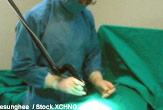Face Transplant Patient Should be 'Pleasant Looking'

Update: 12:15 p.m. ET Dec. 1:
(AP) The French woman who got the world's first partial face transplant after being maimed by a dog "should turn out to be a pleasant-looking girl,'' said a surgeon familiar with her case.
Dr. Earl Owen of Sydney, Australia, told the Sydney Morning Herald he supervised the surgeons in France who grafted the nose, lips and chin onto the injured 38-year-old woman on Sunday. The surgery was done in a hospital in Amiens in northern France.
The facial parts were taken from a brain-dead donor whose family gave their consent, according to a statement from French hospitals.
Owen said the woman with the new face, whose identity has not been revealed, will look more like herself than the donor, who he said was a woman.
"We expect the bone structure underneath to be a more powerful delineator of what the outcome will be physically than the skin and the nose and the lips,'' Owen told the Morning Herald. "She still has her own eyes, which are a lot of a person's expression ... we'd expect she'd turn out to be a pleasant-looking girl.''
He said she was attacked by her own dog.
Get the world’s most fascinating discoveries delivered straight to your inbox.
Owen said a face transplant was the only chance of giving her an acceptable appearance.
It will be months, perhaps years, before it's known if the transplant is a success.
Original story:
LYON, France (AP) -- Doctors have performed the world's first partial face transplant, grafting a nose, lips and chin onto a 38-year-old woman disfigured by a dog bite, hospital officials said Wednesday.
The surgery was performed Sunday, said a statement from medics at hospitals in Lyon and Amiens. The surgery was performed in Amiens in northern France, but doctors from both hospitals participated.
One of the doctors who performed the surgery, Jean-Michel Dubernard, would not discuss the case when contacted by The Associated Press.
"We still don't know when the patient will get out,'' he said.
A news conference is planned for Friday.
The hospitals' statement said the woman was in "excellent'' condition, and the transplanted organs looked "normal.'' She wants to remain anonymous, the statement added.
The woman was disfigured by a dog bite in May, and the injury made it difficult for her to speak and chew, the statement said. Such injuries are "extremely difficult, if not impossible'' to repair using normal surgical techniques, it added.
The organs were taken from a donor who was brain dead, with the family's consent, the statement said.
Experts say the mouth and nose are the most difficult parts of the face to transplant.
Doctors elsewhere have performed scalp and ear transplants.
Dubernard collaborated in the transplant with Bernard Devauchelle.
Dubernard also led teams that performed a forearm transplant on a 49-year-old New Zealander in September 1998 and the first double arm transplant in January 2000 on Denis Chatelier, who lost both forearms when a model rocket he was trying to launch exploded.
Scientists around the world are working to perfect the technique involved in transplanting faces. Today's best treatments still leave many people with freakish, scar-tissue masks that don't look or move like natural skin.
A complete face transplant, which involves applying a sheet of skin in one operation, has never been done before. The procedure is complex but would use standard surgical techniques.
Critics say the surgery is too risky for something that is not a matter of life or death, as regular organ transplants are.
The main worry is that if the immune system rejects the transplant, the skin will slough off, leaving the patient worse off than before. Complications also could include infections that turn the new face black and require a second transplant or reconstruction with skin grafts.
Drugs to prevent rejection would be needed lifelong, and they raise the risk of kidney damage and cancer.
Such concerns have delayed plans to attempt the operation in England.
In France, ethics authorities rejected an application by doctors to try the surgery last year but left the door open for partial transplants around the mouth and nose.
In the United States, the Cleveland Clinic is among those planning to try a face transplant.
Dr. Maria Siemionow, a surgeon at the Cleveland Clinic, said the French do not appear to have tried conventional reconstruction with skin grafts before doing the risky and radical partial face transplant, raising ethical concerns about subjecting a patient to the risks of immune suppression without first exhausting normal remedies.
At least one other partial transplant has been published -- Korean doctors who gave the scalp and ears of a young man to an elderly woman disfigured by the skin cancer melanoma. The outcome of that case is not known.
- Dozen to Interview for Chance at Face Transplant
- Printable Skin: 'Inkjet' Breakthrough Makes Human Tissue
- Lasting Impression: How Fingerprints are Created


